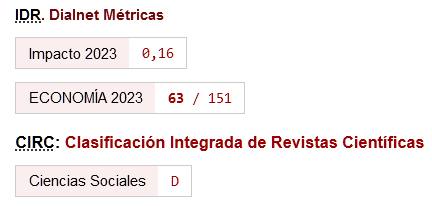La fundamental convergencia téorica en el pensamiento econonómico keynesiano y el estructuralismo funcionalista de Talcott Parsons
Palabras clave:
teoría económica, teoría sociológica, keynesianismo, estructural-funcionalismo, convergencia teóricaResumen
Esta investigación pretende demostrar la fundamental convergencia teórica existente entre las aportaciones procedentes del pensamiento económico keynesiano y del estructural-funcionalismo sociológico de Talcott Parsons. Con tal propósito, procedemos a agrupar y comparar dichas contribuciones en torno a tres categorías: teleología, epistemología y metodología. A la vista de los resultados, concluimos que, si bien el estructural-funcionalismo parsoniano comparte el interés práctico de comprensión por el que se decantan tanto Keynes, como los economistas postkeynesianos, también desarrolla una epistemología híbrida, el "realismo analítico", que le sitúa a medio camino entre el "realismo crítico" que estos defienden y el "formalismo analítico" propugnado por los autores neokeynesianos. Sin embargo, esta situación no se traslada al ámbito metodológico ya que Parsons se inclina, como Keynes y los postkeynesianos, por valerse de una metodología lógico-deductiva
Descargas
Citas
Bell, Daniel ([1973] 2001): El Advenimiento de la Sociedad Post-industrial, Madrid: Alianza Editorial.
Coddington, Alan (1976): "Keynesian Economics: The Search for First Principles", Journal of Economic Literature Nº 14 (4), pp. 1258-1273.
Davidson, Paul (1982): International Money and the Real World, Londres: Macmillan.
https://doi.org/10.1007/978-1-349-16679-4
Davidson, Paul (1994): Post Keynesian Macroeconomic Theory: A Foundation for Successful Economic Policies for the Twenty-first Century, Aldershot, Hants: Edward Elgar.
Garegnani, Pierangelo (1979): "Notes on Consumption, Investment and Effective Demand: a Reply to Joan Robinson", Cambridge Journal of Economics Nº 3 (2), pp. 181-187.
Gerhardt, Uta (2002): Talcott Parsons: an Intellectual Biography, Cambridge: Cambridge University Press.
https://doi.org/10.1017/CBO9780511527586
Habermas, Jürgen (1968): "Conocimiento e Interés" en Jiménez, Manuel (eds.) Jürgen Habermas. Conocimiento e Interés. Edmund Husserl. La Filosofía en la Crisis de la Humanidad Europea, Valencia: Uníversitat de Valencia, 1997, pp. 33-47.
Habermas, Jürgen (1981): La Teoría de la Acción Comunicativa II. Crítica de la Razón Funcionalista, Madrid: Taurus, 1992.
Hayek, Friedrich. A. von (1931a): "Reflections on the Pure Theory of Money of Mr. J.M. Keynes", Economica Nº 33, pp. 270-295.
https://doi.org/10.2307/2548035
Hayek, Friedrich A. von (1931b): Prices and Production, Nueva York: Augustus M. Kelley Publishers, 1967.
Hicks, John R. (1937): "Mr. Keynes and the Classics. A Suggested Interpretation", Econometrica Nº 5, pp. 147-159.
https://doi.org/10.2307/1907242
Hicks, John R. (1980-1981): "IS-LM: An Explanation", Journal of Post Keynesian Economics Nº 3 (2), pp. 139-154.
https://doi.org/10.1080/01603477.1980.11489209
Keynes John M. (1921): A Treatise on Probability, Londres: Macmillan and Co.
Keynes, John M. (1930): Tratado Sobre el Dinero, Madrid: Síntesis, 2010.
Keynes, John M. (1931): "The Pure Theory of Money. A Reply to Dr. Hayek", Economica Nº 34, pp. 387-397.
https://doi.org/10.2307/2549192
Keynes, John M. (1936): Teoría General de la Ocupación, el Interés y el Dinero, México: Fondo de Cultura Económica, 1965.
Keynes, John M. (1938): The Collected Writings of John Maynard Keynes. Volumen XIV, Cambridge: Royal Economic Society, 1978.
Lamo de Espinosa, Emilio (2001): "La Sociología del Siglo XX", REIS. Revista Española de Investigaciones Sociológicas Nº 96, pp. 21-49.
https://doi.org/10.2307/40184382
Lawson, Tony (1994): "The Nature of Post Keynesianism and its Links to other Traditions: a Realist Perspective", Journal of Post Keynesian Economics Nº 16 (4), pp. 503-538.
https://doi.org/10.1080/01603477.1994.11489998
Leijonhufvud, Axel (1968): On Keynesian Economics and the Economics of Keynes: A Study in Monetary Theory, Nueva York: Oxford University Press.
Moya Valgañón, Carlos (1965): "Talcott Parsons y la Vocación Actual de la Teoría Sociológica", Revista de Estudios Políticos Nº 143, pp. 149-164.
Parsons, Talcott (1932): "Economics and Sociology: Marshall in Relation to the Thought of his Time", The Quarterly Journal of Economics Nº 46 (2), pp. 316-347.
https://doi.org/10.2307/1883233
Parsons, Talcott (1936): "Pareto's Central Analytical Scheme" en Camic, Charles (eds.) The Early Essays, Chicago y Londres: University of Chicago Press, 1991, pp.133-150.
Parsons, Talcott (1937): La Estructura de la Acción Social. II Vols, Madrid: Ediciones Guadarrama, 1968.
Parsons, Talcott (1939): Actor, Situation and Normative Pattern. An Essay in the Theory of Social Action, Viena: Lit Verlag Münster, 2010.
Parsons, Talcott (1951): The Social System, Nueva York: The Free Press of Glencoe, 1964.
Parsons, Talcott (1978a): Action Theory and the Human Condition, Nueva York: Free Press.
Parsons, Talcott (1978b): Autobiografía Intelectual. Elaboración de una Teoría del Sistema Social, Bogotá: Ediciones Tercer Mundo.
Parsons, Talcott (1979-1980): "On Theory and Metatheory", Humboldt Journal of Social Relations Nº 7 (1), pp. 5-16.
Parsons, Talcott y Edward Shils (1951): Toward a General Theory of Action, Cambridge: Harvard University Press.
https://doi.org/10.4159/harvard.9780674863507
Phillips, Alban W. (1958): "The Relationship between Unemployment and the Rate of Change of Money Wages in the United Kingdom 1861-1957", Economica New Series Nº 25 (100), pp. 283-299.
https://doi.org/10.1111/j.1468-0335.1958.tb00003.x
Robinson, Joan (1933): The Economics of Imperfect Competition, Londres: Macmillan, 1969.
https://doi.org/10.1007/978-1-349-15320-6
Robinson, Joan (1953a): "Imperfect Competition Revisited", The Economic Journal Nº 63 (251), pp. 579-593.
https://doi.org/10.2307/2226447
Robinson, Joan (1953b): "The Production Function and the Theory of Capital", The Review of Economic Studies Nº 21 (2), pp. 81-106.
https://doi.org/10.2307/2296002
Robinson, Joan (1980): "Time in Economic Theory", Kyklos Nº 3 (2), pp. 219-229.
https://doi.org/10.1111/j.1467-6435.1980.tb02632.x
Robinson, Joan (1985): "The Theory of Normal Prices and Reconstruction of Economic Theory" en Feiwel, George R. (eds.) Issues in Contemporary Macroeconomics and Distribution, Albany: State University of New York Press, pp. 157-165.
https://doi.org/10.1007/978-1-349-06879-1_4
Samuelson, Paul A. (1943): "Full Employment After the War" en The Collected Scientific Papers of Paul A. Samuelson. Volumen 2, Boston: The MIT Press, 1991.
Samuelson, Paul A. (1947): Foundations of Economic Analysis, Cambridge y Londres: Harvard University Press, 1983.
Samuelson, Paul A. (1952): "Economic Theory and Mathematics: An Appraisal", The American Economic Review Nº 42 (2), pp. 56-69.
Samuelson, Paul A. (1969): "Classical and Neoclassical Theory" en Clower, Robert W. (ed.) Monetary Theory, Londres: Penguin Books.
Samuelson, Paul A. (1970a): "Maximum Principles in Analytical Economics. Nobel Memorial Lecture, 11 December, 1970" en Lindbeck, Assar (eds.) Nobel Lectures in Economic Sciences. 1969-1980, Singapur: World Scientific Publishing Co., 1992, pp. 62-77.
Samuelson, Paul A. (1970b): Curso de Economía Moderna. Una Descripción Analítica de la Realidad Económica, Madrid: Aguilar.
Samuelson, Paul A. y Robert M. Solow (1960): "Analytical Aspects of Anti-Inflation Policy", American Economic Review Papers and Proceedings Nº 50 (2), pp. 177-194.
Shackle, George L. S. (1972): Epistemics & Economics: A Critique of Economic Doctrines, Cambridge: Cambridge University Press.
Descargas
Publicado
Cómo citar
Número
Sección
Licencia
Esta licencia permite a terceros compartir (copiar y redistribuir el material en cualquier medio o formato) y adaptar (remezclar, transformar y crear a partir del material para cualquier finalidad, incluso comercial), siempre que se reconozca la autoría y la primera publicación en esta revista (La Revista, DOI de la obra), se proporcione un enlace a la licencia y se indique si se han realizado cambios en la obra.







